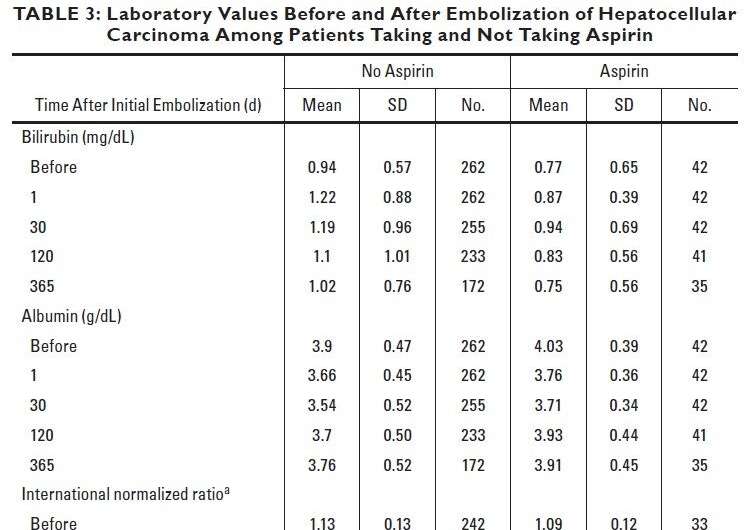Aspirin improves liver function after embolization of hepatocellular carcinoma

Aspirin therapy is associated with both improved liver function test results and survival after transarterial embolization (TAE) for hepatocellular carcinoma (HCC), according to an ahead-of-print article published in the September 2019 issue of the American Journal of Roentgenology (AJR).
In a retrospective review of 304 patients led by F. Edward Boas at Memorial Sloan Kettering Cancer Center in New York City, among the 42 patients taking aspirin at the time of initial TAE for HCC, bilirubin level evidenced lower 1 day (0.9 vs 1.3, p < 0.001), 1 month (0.9 vs 1.2, p = 0.048), and 1 year (0.8 vs 1.0, p = 0.021) post-embolization.
"Although the differences in liver function test results in the groups taking and not taking aspirin were small," wrote Boas, "standard biochemical liver function tests are insensitive to early cirrhotic changes."
Clarifying further, Boas noted, "small changes in biochemical liver function test results might underestimate the degree of liver injury after embolization."
Whereas aspirin use indicated no disparity in initial response rate (88% vs 90% complete response or partial response, p = 0.59), median time to progression (6.2 vs 5.2 months, p = 0.42), initial site of progression (p = 0.77), or fraction of patients dying with disease progression (88% vs 89%, p = 1.00), the median overall survival period after TAE for HCC measured longer for the cohort taking aspirin (57 vs 23 months, p = 0.008).
Despite comparable liver function, American Joint Committee on Cancer stage, comorbidities, and other clinical characteristics before embolization in both groups, because his study was retrospective, Boas acknowledged that a confounding variable may account for the improved survival among patients taking aspirin.
More information: F. Edward Boas et al, Aspirin Is Associated With Improved Liver Function After Embolization of Hepatocellular Carcinoma, American Journal of Roentgenology (2019). DOI: 10.2214/AJR.18.20846


















